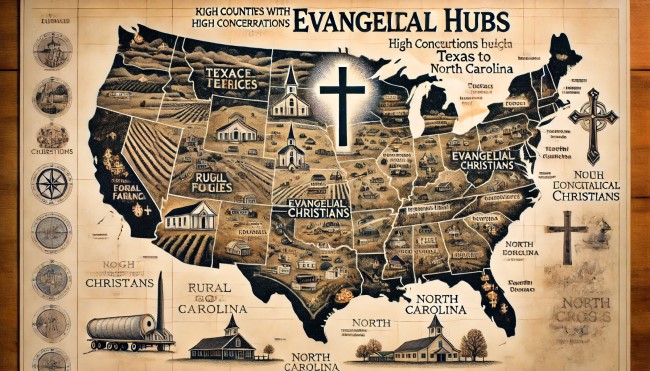Evangelical Hubs: Exploring the Cultural, Religious, and Social Landscape of America’s Heartland

Evangelical Hubs are regions in the United States where the evangelical Christian faith has deep roots and a profound influence on local culture, politics, and community life. These areas, concentrated primarily in the southern states, form a distinctive belt stretching from Texas to North Carolina. Evangelical Hubs are not only defined by their religious adherence but also by their socio-economic characteristics, political leanings, and the lifestyle of their predominantly rural and suburban populations.
What are Evangelical Hubs?
Evangelical Hubs are counties with a high concentration of evangelical Christians, notably tied to denominations such as the Southern Baptist Convention, the Assemblies of God, and other Pentecostal movements. These regions tend to be overwhelmingly white, with a significant portion of the population identifying as politically conservative. Evangelical Hubs played a critical role in the election of Donald Trump, with 77% voting for him in 2016 and 79% in 2020.
These areas are often seen as culturally distinct from other parts of the country. While they may share a strong sense of community and shared values, they also face significant challenges, including lower incomes, limited access to healthcare, and higher rates of teen pregnancy compared to national averages. Despite these socio-economic hurdles, the community’s faith and shared religious identity create a powerful sense of belonging and purpose.
The Geography of Evangelical Hubs
Evangelical Hubs are heavily concentrated in the southern United States, forming what some call the “Bible Belt.” This region encompasses parts of Texas, Oklahoma, Arkansas, Louisiana, Mississippi, Alabama, Georgia, and the Carolinas. Evangelical Hubs can also be found in smaller numbers in the Midwest and Appalachia, particularly in states like Kentucky, Tennessee, and West Virginia.
These regions are often rural or suburban, with small towns playing a central role in community life. The rural setting amplifies these areas’ cultural and religious homogeneity, where evangelical churches often serve as the focal point for community gatherings, social activities, and political mobilization.
Religious and Cultural Identity
Religion plays a central role in the identity of Evangelical Hubs. For many residents, their faith is a personal belief system and a guiding principle for their daily lives, social interactions, and political choices. Evangelical churches in these regions often serve as more than just places of worship. They are community centers where people gather for social events, volunteer work, and political activism.
The strong religious culture in these hubs manifests in many ways. For example, in places like southwestern Missouri, massive religious landmarks like the “Branson Cross,” a 20-story-high structure, symbolize the community’s deep Christian roots. Evangelical radio stations, Christian bookstores, and religious billboards dot the landscape, further reinforcing the pervasive influence of faith.
A vital element of the evangelical worldview in these areas is the belief in America’s moral and spiritual decline. This sentiment is often echoed in religious radio programs, which portray the country as increasingly hostile to Christian values. Many evangelical Christians in these hubs believe they are living in a fallen world, and their faith often emphasizes the importance of being “set apart” from the broader society, which they see as morally decaying.
Evangelical Hubs and Politics
Evangelical Hubs are among the most politically conservative regions in the United States. Their overwhelming support for Donald Trump in 2016 and 2020 reflects a broader trend of evangelical Christians aligning with the Republican Party, particularly on issues like abortion, religious freedom, and opposition to LGBTQ+ rights.
Many evangelical voters in these hubs are motivated by a belief that the U.S. is losing its Christian heritage and moral foundation. This perspective fuels their support for candidates and policies that promise to restore traditional values and protect religious freedoms. In these communities, political engagement is often framed as a moral duty, with evangelical leaders encouraging their congregations to vote by their faith.
The political influence of Evangelical Hubs extends beyond elections. Evangelical churches in these areas often actively shape public policy, particularly on education, family values, and religious freedom. Community events, rallies, and sermons frequently emphasize voting for candidates who uphold Christian principles, further reinforcing the strong connection between faith and politics in these regions.
Socio-Economic Challenges in Evangelical Hubs
Despite their cultural and political influence, Evangelical Hubs face significant socio-economic challenges. These regions tend to have lower household incomes, with a median of around $47,000 compared to the national average. Education levels are also lower, with only about 16% of the population holding a bachelor’s degree or higher.
Access to healthcare is a particular concern in these areas, with nearly twice the population per primary care physician compared to the national average. Other health challenges, such as high rates of teen pregnancy, compound this limited access to medical care. Evangelical Hubs have a teen birth rate of 36 per 1,000 females aged 15 to 19, nearly double the national average.
In addition to healthcare challenges, broadband access is lower in these regions, with only 76% of households having access to high-speed internet. This lack of connectivity can limit educational and economic opportunities, further contributing to the socio-economic struggles of Evangelical Hubs’ residents.
The Role of Faith in Overcoming Challenges
Despite these challenges, the strong religious faith that defines Evangelical Hubs provides a source of resilience for many residents. Churches in these areas often play a crucial role in providing social support through food banks, counseling services, or community outreach programs. Faith-based initiatives are frequently aimed at addressing some of the socio-economic issues facing these communities, such as poverty, addiction, and family breakdown.
For many residents of Evangelical Hubs, their faith provides a sense of purpose and a framework for understanding and overcoming adversity. The belief in divine providence and the importance of living a moral life helps foster hope and optimism, even in the face of economic hardship and social challenges.
The Future of Evangelical Hubs
As the United States becomes more diverse and urbanized, Evangelical Hubs remain cultural and religious enclaves somewhat insulated from the broader trends shaping the rest of the country. However, these regions are not immune to change. Younger generations in Evangelical Hubs are increasingly exposed to new ideas and cultural influences through the internet and social media, which could lead to shifts in attitudes over time.
At the same time, evangelical leaders in these regions are working to adapt to the changing cultural landscape, emphasizing the need for evangelism and outreach in an increasingly secular society. While the traditional values of Evangelical Hubs may face challenges in the years ahead, their strong sense of community and deep religious faith will likely remain central to their identity.
Conclusion
Evangelical Hubs are a distinctive and influential part of America’s cultural and political landscape. Defined by their religious solid adherence, conservative values, and socio-economic challenges, these regions offer a unique window into the intersection of faith, politics, and community life in rural and suburban America. As the country continues to evolve, Evangelical Hubs will likely remain a powerful force in shaping the nation’s religious and political future, driven by their deep commitment to faith and enduring belief in preserving traditional Christian values.


